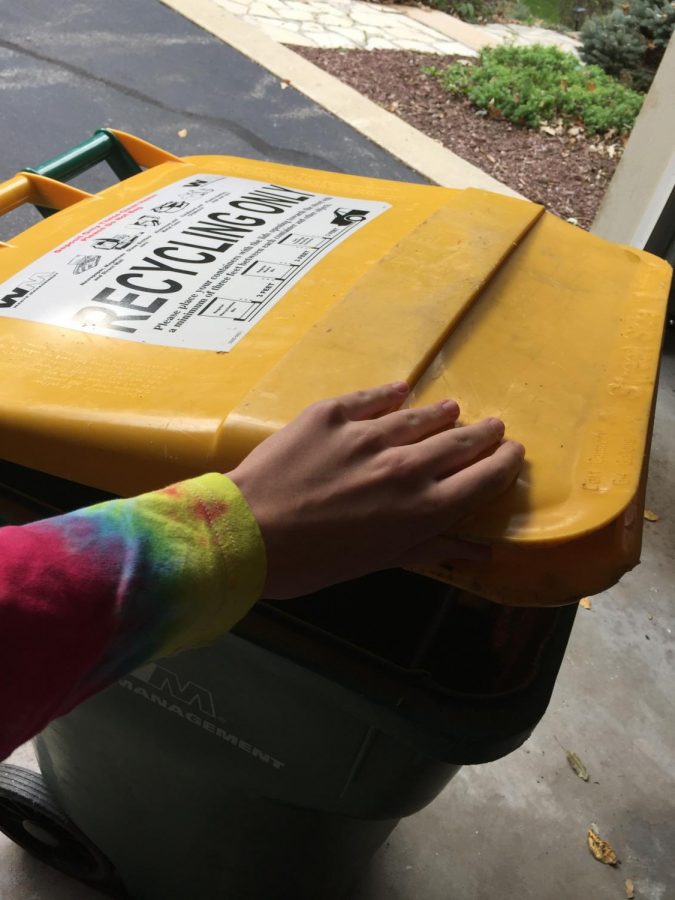School takes shot at sustainability: clubs, administration think of environmental initiatives
Photo by Photo by Max Feldman
Students often see recycling bins at home and school, but this recycling may not be enough. Several students are pushing for composting programs that would decrease wastefulness in the cafeteria.
Everyone loves to indulge. No, not indulging in a massive piece of chocolate cake, but that guilty pleasure of turning up the heat, or even taking a long, hot shower. The school is trying to prevent the wasting of these kinds of resources, whether it be through student action or administrative decisions.
Students and faculty are trying to have their cake and eat it too by pushing for cost-effective, eco-friendly initiatives. The REACT club, in particular, pushes a lot of programs to make the school more environmentally friendly, such as a better recycling system and even the idea of composting, Julie Gyarmaty, science teacher and REACT sponsor, says.
“This year the club is looking at the possibility of doing some composting in the cafeteria,” Gyarmaty said. “I think we can still improve our recycling program, we should be working with waste management to model what they do at museums in Chicago, or college campuses, where next to everything is recycled or composted.”
Administrative officials like Ryan Rubenstein, assistant principal, however, say that composting is difficult to attain because of the space in the cafeteria and the amount that would be composted. According to Rubenstein, the school does a lot to decrease waste in other ways, such as automated heating and cooling systems.
“The other part that’s kind of unseen is what we do during the evening or on weekends with our own building automation systems,” Rubenstein said. “[Our heating and cooling systems] will get shut down on the weekends, or temperatures will be changed so that they are not running as much as they would be on a regular school day.”
Some students in the REACT club, like Kirsten Mazurkiewicz, senior, says that the school could be doing more. Ranging from simple tasks like getting students more involved environmentally to redoing parts of the school, Mazurkiewicz says that a lot can change.
“Making the restoration and gardening opportunities available [for students] would [allow] them to [come] into closer contact with [the] environment,” Mazurkiewicz said. “[Another way] to improve would be getting [manual flush toilets] if the school ever happens to get a bathroom re-done, since automatically flushing toilets waste water.”
Students are not the only ones that have recognized the wastefulness of automatic flush toilets. These toilets have come under some scrutiny, as they use 54% more water than manual toilets, according to John Koeller, a California based researcher. Rubenstein says that environmental initiatives like more efficient toilets are worth looking into, but that usually those projects cost too much for the school. Rubenstein continued to say that projects like solar panels do not make much sense economically.
“When you’re looking at entire building systems, you’re looking at millions of dollars being spent on just [solar panels],” Rubenstein said. “To get that back in return with the amount of energy use you have takes quite some time, sometimes even the life of the solar panel.”
Due to the district’s unwillingness to pay for such massive projects, students need to influence the administration’s decisions more to make real improvement, according to Gyarmaty. The most change will come from the administration being in line with student goals, Gyarmaty says.
“I think that the administration is usually supportive of student initiatives, [but] we have to think about the school board [and how that impacts] projects that could be looked at,” Gyarmaty said. “The students in REACT club really are pushing for certain things, and the more those students make their voices heard, the more will change.”

As a senior, this is Max’s third year on staff and first year as magazine editor in chief for the Bear Facts program. He aspires to study environmental...


